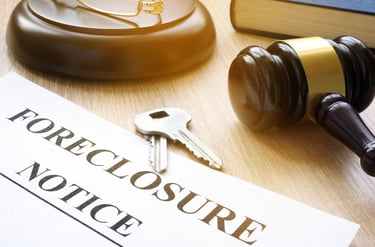Best Ways to Sell My House to Avoid Foreclosure
If you're facing foreclosure, selling your house can be a way out. This guide covers how to sell my house to avoid foreclosure, providing the necessary steps and tips.
Understanding Foreclosure
What is Foreclosure and How does it work?
Foreclosure is a legal process initiated by a lender when a borrower defaults and fails to make their mortgage payments. Essentially, if you miss your monthly mortgage payments, the lender has the right to take possession of your property to recover the outstanding debt. This process begins with the lender sending a notice of default, which serves as a formal warning that you are behind on your payments and need to take action.
The foreclosure process can vary depending on the state and the type of mortgage you have. In some states, the process is judicial, meaning it goes through the court system, while in others, it is non-judicial and handled outside of court. Regardless of the method, the end goal for the lender is to sell the property, often through a foreclosure sale, to recoup the unpaid debt.
The Foreclosure Process Timeline
The foreclosure process typically starts when you miss a mortgage payment. Initially, the lender will send a notice of default, giving you a specific period to catch up on your missed payments. This period is crucial as it offers a chance to avoid foreclosure by reinstating your mortgage through paying the overdue amount along with any additional fees.
If you fail to make the necessary payments within the given timeframe, the lender can proceed with filing a lawsuit to foreclose on the property. The timeline for this process can vary significantly, ranging from several months to over a year, depending on state laws and the specifics of your mortgage. Understanding this timeline is essential, as it provides a window of opportunity to explore options like selling your home to avoid the full foreclosure process.
Understanding Pre-Foreclosure
Pre-foreclosure is the period before the foreclosure process begins, providing homeowners a chance to avoid losing their home. During this phase, mortgage lenders often work with homeowners to resolve issues, helping both parties avoid the costs and complications of full foreclosure. This period allows homeowners to negotiate, prevent foreclosure actions, and explore alternatives. Refinancing or loan modifications during this time can impact the monthly payment, either increasing or decreasing it based on the new terms.
One of the most effective ways to avoid foreclosure is by selling your home prior to the foreclosure auction date. This step helps pay off outstanding debt and potentially saves your credit score from significant damage. Most lenders are usually more cooperative to avoid the lengthy and costly foreclosure process.
Preparing the home for sale during this time can maximize options. Making necessary repairs, cleaning, and staging the home can help attract buyers quickly, enabling a smoother and faster sale. Swift and decisive action can help secure a better financial future.
Key Takeaways
Selling your home during the pre-foreclosure period can help pay off outstanding mortgage debt and protect your credit score.
Know your home's value and calculate your outstanding debt accurately to price your home competitively for a quick sale.
Consider hiring a real estate agent and exploring cash offers to navigate the selling process effectively and minimize complications.




Summary
In conclusion, foreclosure is a challenging and stressful experience, but it's important to know that there are steps you can take to avoid losing your home. By understanding the foreclosure process, preparing your home for sale, evaluating your home's market value, and calculating your outstanding debt, you can make informed decisions to protect your financial future.
Whether you choose a traditional sale, a short sale, or explore options like loan modification with a repayment plan, or refinancing, taking proactive steps can help you prevent foreclosure and minimize the impact on your credit. Working with agents, considering cash offers from investors, and seeking legal and professional help can provide the support you need during this difficult time. Remember, acting swiftly and decisively can make all the difference in reclaiming control over your financial situation.
Frequently Asked Questions
What is pre-foreclosure?
This is the critical phase before foreclosure starts, allowing homeowners the opportunity to take steps to prevent losing their property. It's essential to act during this time to explore options and seek solutions.
How can I determine my home's market value during this time period?
To determine your home's value, utilize online home value estimators and seek a Comparative Market Analysis (CMA) from real estate agents. Engaging with experienced agents can provide further insights into your home's worth.
What documents do I need to gather for a short sale?
To successfully initiate a short sale, gather your income statements, tax returns, and bank statements, as these documents are essential for your lender's assessment. Ensuring you have these ready will streamline the process.
How does a short sale impact my credit score compared to foreclosure?
A short sale typically has a less severe impact on your credit score than a foreclosure, making it a more favorable option if you're facing financial difficulties. Choosing a short sale can help you minimize long-term damage to your credit profile.
Should I seek help facing foreclosure?
Yes, seeking guidance when facing foreclosure is essential.








Legal Considerations and Seeking Professional Help
When dealing with foreclosure, understanding the legal process is crucial to protect your rights and interests. Consulting with an attorney can provide insight into the specifics of foreclosure laws in your state and available defenses. Legal considerations are crucial when selling a home to stop foreclosure, as they can impact the outcome and your rights.
It is advisable to avoid for-profit debt relief companies, as they can often charge high fees without providing effective assistance. Instead, seek help from nonprofit foreclosure prevention agencies. Grace Hill Solutions can offer valuable guidance and support throughout the foreclosure process.
By seeking professional help, you can navigate the complexities of foreclosure more effectively and ensure that you make informed decisions that protect your financial future. Whether it's legal advice or assistance from a nonprofit agency, professional support can make a significant difference in avoiding foreclosure and preserving your home.
Mortage Loan Modification and Refinancing Options
Loan modification and refinancing are alternatives to selling your home that can help prevent foreclosure. Mortgage modification assists those struggling with payments by allowing changes to loan terms. To qualify for a loan modification, homeowners typically must show evidence of financial hardship and missed mortgage payments and may also consider loan modifications.
Refinancing involves obtaining a new mortgage to replace the existing one, which can help lower the interest rate and monthly payment. While modification may not require closing costs, refinancing usually involves these fees, averaging around $5,000. Both options have their pros and cons, and homeowners must evaluate which is best for their situation.
Applying for a loan modification can prolong the foreclosure process, giving you more time to get your finances in order. However, refinancing can also be a viable option if you meet credit and income requirements, even if you are not in financial distress. The lender can sometime help setup a repayment plan for struggling homeowners.
Impact on Credit Report and Future Mortages
Facing foreclosure can have long-lasting effects on your credit report and future borrowing opportunities. Foreclosures involve severe credit damage, lasting up to seven years, making future borrowing difficult. A foreclosure on your credit record can lead to a drop in credit score by 85 to 160 points, which can significantly impact your ability to secure loans or credit in the future.
Compared to foreclosure, short sales generally lead to a less severe impact on credit scores. Although a short sale is also recorded on your report, it typically results in a smaller drop in your credit score, which can be easier to recover from. Despite the negative impact of foreclosure on credit, it is still possible to qualify for a mortgage afterward.
After selling your house to prevent foreclosure, it's essential to review your credit reports and plan to repair credit by making on-time payments and managing other debts responsibly. Avoiding foreclosure through a sale can help preserve equity and improve future home-buying opportunities.
Impact on Credit Report and Future Mortages
Facing foreclosure can have long-lasting effects on your credit report and future borrowing opportunities. Foreclosures involve severe credit damage, lasting up to seven years, making future borrowing difficult. A foreclosure on your credit record can lead to a drop in credit score by 85 to 160 points, which can significantly impact your ability to secure loans or credit in the future.
Compared to foreclosure, short sales generally lead to a less severe impact on credit scores. Although a short sale is also recorded on your report, it typically results in a smaller drop in your credit score, which can be easier to recover from. Despite the negative impact of foreclosure on credit, it is still possible to qualify for a mortgage afterward.
After selling your house to prevent foreclosure, it's essential to review your credit reports and plan to repair credit by making on-time payments and managing other debts responsibly. Avoiding foreclosure through a sale can help preserve equity and improve future home-buying opportunities.
Exploring Offers from Investors
Cash offers from real estate investors are a viable option for homeowners. These buyers typically purchase homes without contingencies, minimizing complications during the sale. These offers allow for quicker sales, crucial with a looming foreclosure.
Grace Hill Solutions, for example, can help individuals buy homes for cash and offer leaseback options for those needing more time after closing. This flexibility allows for seamless transitions for homeowners. When you don't want to spend money selling property with a realtor, a cash offer may be a good option and help reduce selling fees.




Working with Real Estate Agents
Hiring an agent is important for several reasons. An experienced agent knows how to facilitate foreclosure sales and prevent unnecessary risks. They can help determine home value, negotiate with lenders, and ensure compliance with legal requirements.
A knowledgeable agent can guide you through the complexities of foreclosure sale, confirm financial calculations, and assist in preparing, staging, and marketing the home. Agents often have networks including potential buyers and investors, increasing the chances of a quicker sale.
An agent who can list your property on the multiple listing service (MLS) can help you avoid financial trouble and get your house sold to a qualified buyer. Working with a skilled agent helps navigate the process more smoothly and effectively.
Steps to Complete a Short Sale
Completing a short sale involves proving to your lender that you cannot afford your house and have no liquid assets to cover the mortgage. Homeowners must submit a loss mitigation application to the servicer to start the short sale process.
Gathering Financial Documentation
Gather all necessary financial documentation. Lenders typically require income statements, tax returns, and bank statements to assess financial stability. These documents demonstrate your financial hardship and inability to continue making mortgage payments.
Having these documents ready and organized can expedite the process, making it easier for the lender to review and approve the sale. Ensure all information is up-to-date and accurately reflects your current financial status.
Submitting a Hardship Letter
A hardship letter is a key component of the short sale proces. The letter explains to the mortgage company the circumstances that led to your financial difficulties and outlines your current situation. Common reasons include job loss, medical expenses, divorce, and other significant life changes.
The hardship letter should be concise, ideally no longer than one page, focusing on relevant facts. Avoid mentioning potential future income or blaming the lender, as this could harm your request. Including contact information for a housing counselor shows you have explored all options to prevent foreclosure, including any foreclosure notice you may have received.
Negotiating with Lenders
Negotiating with lenders is a key step during a short sale. Homeowners must prove their inability to afford the mortgage and lack of liquid assets to get approval. Be prepared for potential counteroffers from the lender, which may involve conditions like a higher selling price or paying for repairs.
Real estate agents can facilitate these negotiations, leveraging their expertise to improve the chances of approval. Working with an agent helps navigate the complexities of the short sale process and increases the chances of a successful outcome.
Traditional Sale vs Short Sale
Decide between a traditional sale and a short sale. A traditional home sale involves selling at market value and using the proceeds to pay off your mortgage loan. This option allows more control over the sale process and can avoid negative impacts on your credit score.
A short sale occurs when the sale price is less than the outstanding mortgage balance. This requires lender approval and submitting necessary documentation. Short sales carry less stigma than foreclosures but can lead to forgiven debts being taxable and may be lengthy.
Choosing between a traditional sale and a short sale depends on your financial situation and market conditions. If your home's market value is significantly lower than your debt, a short sale might be the best option. If you can sell your home at or above the mortgage balance, a traditional sale could avoid the complexities and potential property tax implications of a short sale.
Calculating Outstanding Mortage Debt
Accurately calculating your outstanding debt is crucial when selling your home to prevent foreclosure. Review your mortgage statements for key details like the unpaid principal balance and interest rate to determine the remaining mortgage balance. This information is essential for understanding how much you owe and what needs to be covered once the house is sold. Changes in the mortgage structure or terms can impact the monthly payment, potentially increasing or decreasing the amount you must pay each month depending on your refinancing or loan modification choices.
Contacting your mortgage lender can provide precise figures on your remaining balance and any additional fees. Some lenders impose prepayment penalties for paying off a mortgage early, so clarify these details. Late fees typically begin to accrue 10 to 15 days after a missed payment, adding to your overall debt.
To reinstate your mortgage, pay all missed payments along with interest and fees to restore the loan status. Knowing your exact outstanding loan balance and potential penalties helps you plan your sale effectively and prepare for any mortgage arrears or financial obligations.
Evaluating your Home's Market Value
Knowing your home's market value is vital for a quick sale. Many homeowners use online home value estimators, which utilize public records and data points. The accuracy of these tools varies based on data quality. For example, Zillow covers around 100 million homes and claims a median error rate of 4.3 percent.
While online estimators are a good starting point, their estimates can differ significantly due to variations in comparable homes and data interpretation. Some tools provide a range of estimated values rather than a single number, highlighting valuation uncertainty. Relying solely on these tools might not give the most accurate picture of your home's worth.
Consider getting a Comparative Market Analysis (CMA) from a real estate professional for a more precise evaluation. Experienced agents offer insights into local market trends, crucial for appropriate pricing.
Redfin offers a tool for homeowners to input specific property details, potentially improving estimate accuracy. Combining online estimates with professional advice helps you understand your home's fair market value and price it competitively.
Assessing your Situation
Can I Sell My Home if I'm Behind on Mortgage Payments?
If you find yourself behind on payments, you might wonder if selling your home is still an option. The good news is that you can indeed sell your home, even if you are behind on payments. Acting quickly is crucial, as selling your home before the foreclosure process is complete can help you avoid the severe consequences of foreclosure, such as significant damage to your credit score and the possibility of a deficiency judgment.
When you're behind on payments, it's essential to assess your situation thoroughly. Start by reviewing your financial status and understanding how much you owe on your mortgage. You may have options like working with your mortgage lender to modify your loan terms or temporarily suspend payments. However, if these options are not viable, selling your home might be the best way to prevent foreclosure.
Working with an agent experienced in foreclosure sales can be incredibly beneficial. They can help you determine your home's value, navigate the complexities of the sale process, and negotiate with your lender. By taking swift and informed action, you can sell your home, pay off your mortgage debt, and avoid the long-term repercussions of foreclosure.
Selling your Home before Foreclosure
If you're facing foreclosure, selling your home can be a lifeline. Act promptly to avoid losing your home while still selling at a fair price. Starting the process sooner improves your chances of avoiding foreclosure.
Begin by preparing your home for sale. Repair, clean, and stage your home to attract potential buyers. A well-presented home attracts serious buyers quickly, essential when on a tight timeline. Listing your home at a competitive price can lead to offers within weeks.
Keep clear communication with your mortgage company throughout the process. Inform your lender of your intent to sell and stay updated on foreclosure actions. Keeping them informed can buy additional time and potentially stop foreclosure proceedings, giving you the room to sell your home.




